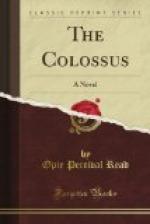“Who am I that I should carp with myself?” the traveler mused. “Have the world and its litter of pups done anything for me?” He walked up and down the deck. “God knows that I shall always love the memory of that dear boy. But if all things are foreseen and are still for the best, why should he have died? Was it to throw upon me this great opportunity? But who am I? And why should a special opportunity be wrought for me? But who is anybody?”
Going whither? Home. A father—and he thought of a drunken painter. A mother—and his mind flew back to a midnight when arms that had carried him warm with life were cold in death. A millionaire’s son—that thought startled him. What were the peculiar duties of a millionaire’s son? No matter. They might impose a strain, but they could never be so trying as constant poverty. But who had afflicted him with poverty? First his birth and then his temperament. But who gave him the temperament? He wheeled about and walked away as if he would be rid of an impertinent questioner.
When the ship reached New Orleans he went straightway to the telegraph office and sent this message to George Witherspoon: “Will leave for Chicago to-day.”
And now his step was beyond recall; he must go forward. But conscience had no needles, and his mind was at rest. In expectancy there was a keen fascination. He met a reporter whom he knew, but there was no sign of recognition. A beard, thick, black and neatly trimmed, gave Henry’s face an unfamiliar mold. But he felt a momentary fear, he realized that a possible danger thenceforth would lie in wait for him, and then came the easing assurance that his early life, his father and his mother, were remembered by no one of importance, and that even if he were recognized as Henry DeGolyer, he could still declare himself the stolen son of George Witherspoon. Indeed, with safety he could thus announce himself to the managing editor who had sent him to Costa Rica, and he thought of doing this, but no, his—his father wanted the secret kept until the time was ripe for its divulgence. He went into a restaurant, and for the first time in his life he felt himself free to order regardless of the prices on the bill of fare. Often, when a hungry boy, he had sold newspapers in that house, and enviously he had watched the man who seemed to care not for expenses. As he sat there waiting for his meal, a newsboy came in, and after selling him a paper, stood near the table.
“Sit down, little fellow, and have something to eat.”
This was sarcasm, and the boy leered at him.
“Sit down, won’t you?”
“What are you givin’ me?”
“This,” said Henry, and he handed him a dollar.
CHAPTER VI.
Waiting at the station.
Men bustling their way to the lunch counter; old women fidgeting in the fear that they had forgotten something; man in blue crying the destination of outgoing trains; weary mothers striving to soothe their fretful children; the tumult raised by cabmen that were crowding against the border-line of privilege; bells, shrieks, new harshnesses here and there; confusion everywhere—a railway station in Chicago.




